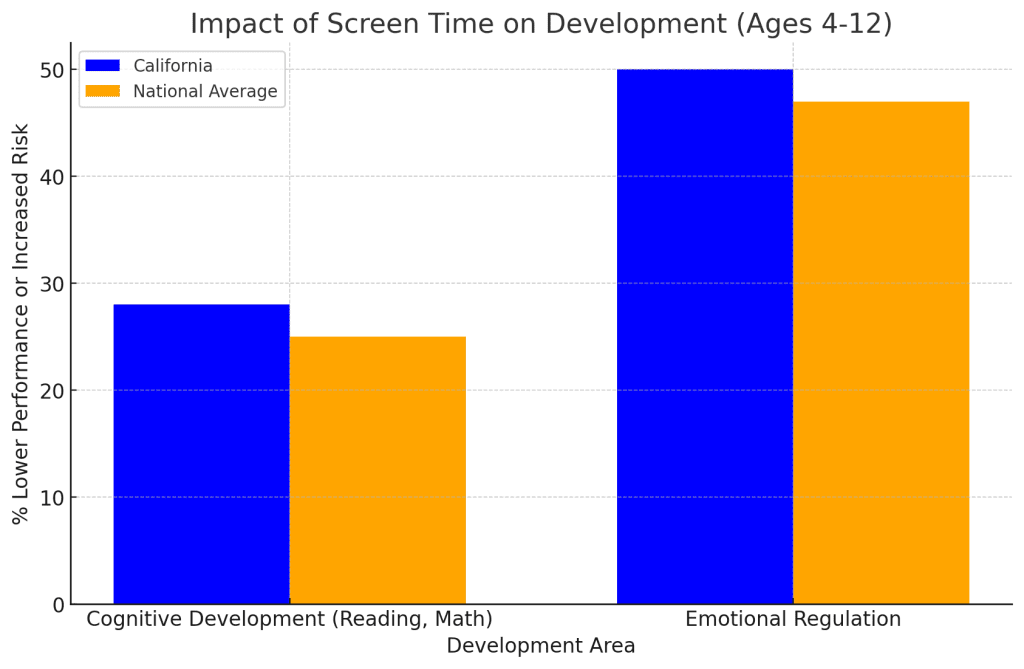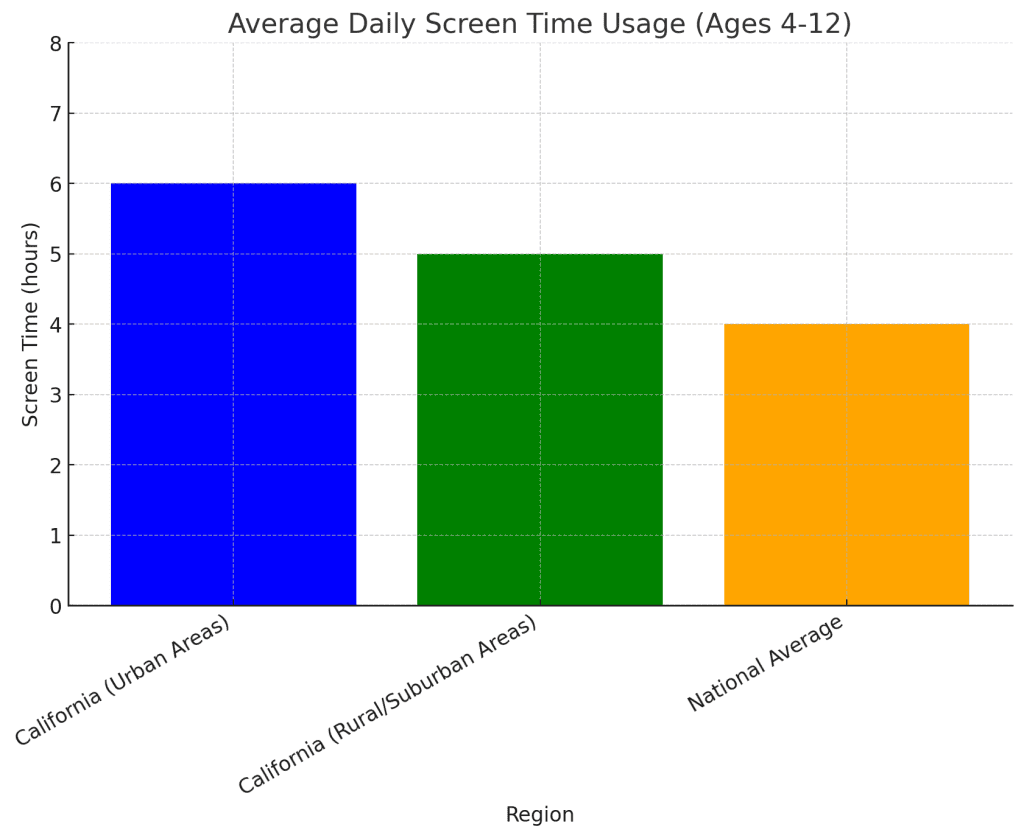We live in a state known for its tech innovation—California is home to Silicon Valley, after all.
Yet, ironically, it’s our very embrace of technology that’s creating a hidden crisis.
Our kids, especially those between 4 and 12, are spending an average of 4 to 7 hours a day glued to screens.
That’s 4 to 7 hours they could be spending learning essential life skills—skills that can’t be taught by swiping and tapping on a screen.
As screens dominate our kids’ daily lives, we parents are left grappling with a tough dilemma:
How do we balance digital engagement with real-world experiences that actually foster growth?
The truth is, while digital skills have their place, they’re nowhere near as valuable as the foundational experiences that shape a child’s cognitive, social, and emotional growth. And right now, we’re getting it all wrong.
The Real Problem: Digital Proficiency Isn’t the Same as Real Learning
Let’s cut to the chase: Essential skills—like critical thinking, emotional intelligence, social interaction, physical fitness, and practical life abilities—aren’t built by watching endless videos or playing games on a tablet. They’re


developed through face-to-face interactions, hands-on activities, and navigating real-world challenges. But somewhere along the way, we’ve started mistaking digital proficiency for real learning.
The default mode of engagement has shifted to screens, often at the expense of these vital skills.
Don’t get me wrong—digital skills have their place in moderation. But when 70% of kids’ screen time is focused on entertainment rather than education (EdTech Magazine, 2023), we’ve got a serious problem.
Parents, let’s be honest.
How often have we reached for that screen to keep the peace or to manage our own busy schedules?
A survey found that 80% of parents use screens as a quick fix to manage behavior or keep kids occupied (MDPI, 2023).
It’s understandable, but it’s also creating a dangerous imbalance.
The Evidence: How Screen Time is Impacting Kids’ Development
Let’s break it down into three key areas where excessive screen time is failing our kids:
- Overemphasis on Digital and Non-Essential Skills: Kids in California are spending a disproportionate amount of time on screens—only 30% of which is educational. The rest? Pure entertainment. We’re raising a generation more adept at consuming content than creating it. And that’s a big problem when creativity and problem-solving are the skills that will matter most in the future job market.
- Deficiencies in Emotional and Social Skills: More screens mean less face-to-face time. Over 75% of kids aged 4 to 12 spend more time on digital devices than in physical play or real conversations (NewYork-Presbyterian, 2023). The result? Many kids are struggling with basic social skills like sharing, listening, or resolving conflicts. Nearly half of these kids show signs of emotional dysregulation, such as frequent tantrums and difficulty managing frustration—skills best learned through real-world interactions.


- The Physical Health and Outdoor Play Deficit: Here’s a shocking stat—only 35% of Californian kids meet daily physical activity guidelines compared to 40% nationally. Safety concerns, limited green spaces, and a higher preference for screens in urban areas only make it worse (ScienceDaily, 2023). Kids aren’t just missing out on fitness; they’re missing out on learning resilience, creativity, and risk-taking through outdoor play.
The Cost of Getting It Wrong: What’s Really at Stake?
We can’t afford to ignore this. Excessive screen time isn’t just keeping our kids quiet—it’s robbing them of critical opportunities for growth. Here’s what it’s costing us:
- Cognitive Development: Kids glued to screens for more than 4 hours a day are performing 28% lower in cognitive assessments, including reading and math, compared to their peers who have a more balanced approach (UCLA Center for Health Policy Research, 2023). That’s a staggering gap that reflects the “digital diet” depriving them of real-world critical thinking and problem-solving experiences.
- Emotional and Social Development: Half of the parents in California reported increased emotional outbursts or signs of emotional dysregulation in children who spend more than 3 hours a day on screens (California Department of Education, 2023). Without real-world social experiences, these kids are falling behind in navigating friendships, conflicts, and emotional challenges.


- Physical Health and Well-Being: With only 35% of kids meeting daily exercise guidelines, we’re looking at rising rates of obesity, poor motor skills, and general health issues (California Health Interview Survey, 2023). Physical activity is about more than just burning energy; it’s about building motor skills, resilience, and creativity—qualities that screens can’t replicate.
California vs. The Nation: Where Do We Stand?
Let’s see how California compares to the rest of the nation in these key areas:
| Indicator | California Average | National Average | Difference/Impact |
|---|---|---|---|
| Screen Time Usage (Ages 4-12) | 5-7 hours/day for urban areas; 4-6 hours/day for rural/suburban areas (Common Sense Media, 2023) | 4-6 hours/day (JAMA Pediatrics, 2022) | Higher in urban CA, reflecting tech-centric culture and lifestyle; slightly above national average in most cases. |
| Cognitive Development (Reading, Math Skills) | 28% lower cognitive performance for those with >4 hours/day screen time (UCLA, 2023) | 25% lower cognitive performance for those with >2 hours/day screen time (Longitudinal Study, 2020) | Comparable negative impact, with slightly worse outcomes in CA due to higher screen usage. |
| Emotional Regulation and Social Skills | 50% of parents report emotional dysregulation in children with >3 hours/day screen time (CDE, 2023) | 47% increased risk of emotional dysregulation for >2 hours/day (Health Matters, 2023) | Similar trends; CA urban children have slightly more reported issues due to longer screen exposure. |
| Physical Activity (Daily Exercise Levels) | 35% of children meet daily physical activity guidelines (CHIS, 2023) | 40% of children meet daily physical activity guidelines (CDC, 2022) | Lower in CA, particularly in urban centers, due to safety concerns and limited access to green spaces. |
| Parental Engagement and Practical Life Skills | 60% of parents rarely involve children in chores or practical skills (Common Sense Media, 2023) | 55% of parents report similar trends nationwide (National Parenting Survey, 2022) | Slightly worse in CA; more screen dependency as a behavioral management tool in urban areas. |
Bringing It Back to Real Life: The 10-Minute Bedtime Detox & Connect Plan
The numbers don’t lie—we’re facing a hidden crisis in child development, driven by excessive screen time and a lack of real-world engagement.
But the solution doesn’t have to be complicated or overwhelming. It can start with something as simple as a nightly routine.
Enter the 10-Minute Bedtime Detox & Connect Plan—a straightforward approach to reclaiming some of that lost time.
Just 10 minutes each evening can make a world of difference.
It’s about winding down from the day without screens, engaging in calming, connection-focused activities like storytelling, puzzles, or just talking about the highs and lows of the day.
These small moments aren’t just about getting ready for bed; they’re about building the essential skills we’ve been talking about—emotional intelligence, creativity, problem-solving, and mindfulness.
Imagine instead of another evening lost to digital distractions, you’re helping your child develop critical skills that screens can’t teach. You’re laying the foundation for them to be resilient, thoughtful, and socially adept—qualities that are becoming rare but are more valuable than ever.
Ready to make a change? Download your free guide to the 10-Minute Bedtime Detox & Connect Plan and start creating more meaningful, screen-free moments with your kids. It’s a small commitment with a big impact. Less screen time, more meaningful time. It starts with us, and it starts now.
References & Bibliography
- California Department of Education. (2023). Impact of Screen Time on Emotional and Social Development.
- California Health Interview Survey (CHIS). (2023). Physical Activity Levels and Health Implications.
- Common Sense Media. (2023). Survey on Parental Engagement and Screen Time.
- EdTech Magazine. (2023). Here’s What the Research Says About Screen Time and School-Aged Kids.
- Health Matters. (2023). What Does Too Much Screen Time Do to Kids’ Brains?
- JAMA Pediatrics. (2022). Screen Time Increase Among Children Post-Pandemic.
- Longitudinal Study. (2020). Cognitive and Emotional Functioning in Children Over Time.
- Multimodal Technologies and Interaction Journal. (2023). Impact of Screen Time on Children’s Development.
- NewYork-Presbyterian. (2023). How Excessive Screen Time Impacts Children’s Emotional Development.
- Osaka University Study. (2023). Getting Kids Outdoors Can Reduce the Negative Effects of Screen Time.
- ScienceDaily. (2023). Outdoor Play Benefits for Child Development.
- UCLA Center for Health Policy Research. (2023). Cognitive and Physical Development in California’s Children.







